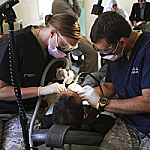 |
| Image Courtesy of Flickr |
If you are diabetic, you have probably know that a link exists between diabetes and oral health. It's important for diabetics to spend time making sure their mouth is in good shape. Read on to learn more about how your condition is linked to gum disease and find some proactive measure you can take to protect your health.
Diabetics are twice as likely as non-diabetics to develop gum disease, which in turn makes it harder to regulate blood glucose levels. Fortunately, there is a way to help manage this issue.
About the Connection
Plaque germs can build up on your teeth, and if left untreated, you will likely develop a mild form of gum disease called gingivitis. If you don't receive proper treatment for gingivitis, it can turn to a more serious gum disease called periodontitis, which leaves infected pockets of bacteria between your teeth and gums.
Diabetes weakens your resistance to bacterial infection, the very kind of infection associated with periodontitis. When infection takes hold, it is harder for a diabetic to get rid of it, and the infection can send blood sugar levels spiraling further out of control.
Diagnosing Gum Disease
While only your dentist or physician can give you an official diagnosis, there are some signs of gum disease you should watch for if you are diabetic. According to the American Diabetes Association, the warning signs of gum disease include:
- Red gums
- Swollen gums
- Sensitive teeth
- Bad breath
- Loose teeth
- Teeth that fall out
Diabetes and Oral Health Care Tips
If you want to be proactive, consider these dental care tips for diabetics:
- Gently brush your teeth a minimum of two times every day for at least two minutes each time. It might sound like a lot of brushing if you are not in the habit, but it's only four minutes out of the 1,440 minutes you have every day, and it can help save your teeth.
- Invest another minute of your day in flossing your teeth.
- Stay current on dental cleanings and exams. Make sure your dentist is aware you are diabetic before the exam begins.
- If you suffer from dry mouth, use an antibacterial mouthwash once or twice a day, and sip water frequently throughout the day.
- Enjoy a healthy lifestyle. Daily exercise and healthy foods can help you maintain a healthy blood glucose level. It's also a good idea to give up smoking if you partake in the habit.